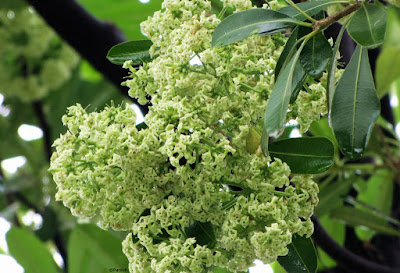A medium-to-large evergreen tree with a dense crown and a straight cylindrical bole... One may not recognise the tree, but he/she will not fail to notice the strong fragrance of the flowers, which bloom October onward. The Scholar tree (Alstonia Scholaris/सातवीण, सप्तपर्णी) is an elegant evergreen species.
 Saptaparni in Sanskrit means ‘seven leaves’, and is based on the fact that 4 to 8 simple leaves - more often seven - occur in a circle at each node around the stem. The tree has traditionally been used to make wooden slates & black boards for school children. Hence the tree is also known as Black board tree. Since ancient times, the Scholar tree has been used to make paper in India. The tree has been also recommended for the manufacture of pencils. These things help to explain the name of the species, scholaris.
Saptaparni in Sanskrit means ‘seven leaves’, and is based on the fact that 4 to 8 simple leaves - more often seven - occur in a circle at each node around the stem. The tree has traditionally been used to make wooden slates & black boards for school children. Hence the tree is also known as Black board tree. Since ancient times, the Scholar tree has been used to make paper in India. The tree has been also recommended for the manufacture of pencils. These things help to explain the name of the species, scholaris. The tree is really elegant whether it is flowering or not. In October small, cream or greenish white colored fragrant flowers appear. Inflorescence mostly formed of dense bunches of flowers, filling the air at dusk with a distinct and unmistakable fragrance. The pungent fragrance is described variously as ‘strong’, ‘heady’, ‘intoxicating’, ‘solidifying the air’, ‘fragrance of peace & contentment’ and so on... Those who like it can’t seem to have enough of it; there are others who complain of headaches and breathing troubles too. It is a tall, fast-growing tree with greyish rough bark and milky sap. The leaves are whorled, that is, several of them coming out of the same point. Leaves are slightly rounded, leathery, dark green in color. This gives the tree a beautiful shape.
The tree is really elegant whether it is flowering or not. In October small, cream or greenish white colored fragrant flowers appear. Inflorescence mostly formed of dense bunches of flowers, filling the air at dusk with a distinct and unmistakable fragrance. The pungent fragrance is described variously as ‘strong’, ‘heady’, ‘intoxicating’, ‘solidifying the air’, ‘fragrance of peace & contentment’ and so on... Those who like it can’t seem to have enough of it; there are others who complain of headaches and breathing troubles too. It is a tall, fast-growing tree with greyish rough bark and milky sap. The leaves are whorled, that is, several of them coming out of the same point. Leaves are slightly rounded, leathery, dark green in color. This gives the tree a beautiful shape.
In India, many tribal peoples believe that the tree is evil and avoid it completely. They say that the tree is inhabited by an evil spirit who will possess any individual who dares walk or sleep beneath it. This spirit is also said to kill any individual who chooses to sleep beneath its branches. Local superstition about the tree mainly stems from the fact that its milky sap is rich in poisonous alkaloid, and thus the tree is shunned by cattle. Thanks to this belief, Devil’s tree has been spared much of the destruction that has faced other species of tree in India.
The hardy species can be grown in a variety of climatic conditions in India. However, it prefers a fairly moist habitat. It is also the State Tree of West Bengal.
Scholar tree has many medicinal properties like anti-microbial, anti-amoebic, anti-diarrheal, anti-hypertensive, anti-malarial, febrifuge, stimulant, hepato-protective, immuno-modulatory, anti-cancer, anti-asthmatic, antioxidant, analgesic, anti-inflammatory, anti-fertility, anti-diabetic etc. In Ayurveda it is used for treating skin disorders and for upper purification process of Panchkarma. It is also useful to purify blood & relieve respiratory disorders and known to rejuvenate the digestive system.
The tree is moderately fast growing & coppice freely. When in flower, they are often surrounded by pollinating bees and butterflies. The fruits open on the tree and the seeds, which have a tuft of silky hairs at each end, are dispersed by wind. It can be easily propagated by seeds and also by cuttings. It is often planted as an avenue tree and as ornamental in gardens.

No comments:
Post a Comment